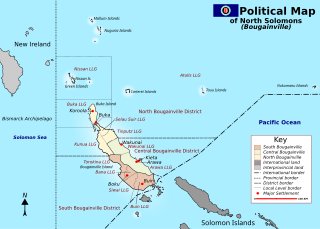Related Research Articles

Bougainville, officially the Autonomous Region of Bougainville, is an autonomous region in Papua New Guinea. The largest island is Bougainville Island, while the region also includes Buka Island and a number of outlying islands and atolls. The current capital is Buka, situated on Buka Island.

Bougainville, an autonomous region of Papua New Guinea (PNG), has been inhabited by humans for at least 29,000 years, according to artefacts found in Kilu Cave on Buka Island. The region is named after Bougainville Island, the largest island of the Solomon Islands archipelago, but also contains a number of smaller islands.
Bougainville Independence Movement (BIM) was a political party in the Autonomous Region of Bougainville, of eastern Papua New Guinea.
Bougainville Labour Party (BLP) is a political party in the Autonomous Region of Bougainville, Papua New Guinea.
New Bougainville Party (NBP) is a political party in the Autonomous Region of Bougainville in Papua New Guinea.
Joseph Canisius Kabui was a secessionist leader and the first President of the Autonomous Region of Bougainville, off the coast of Papua New Guinea, from 2005 to 2008. He was also the leader of the Bougainville People's Congress.
Francis Ona was a Bougainville secessionist leader who led an uprising against the Government of Papua New Guinea as part of the Bougainville Civil War. He and his followers were concerned about the environmental and social effects of the operation of the Panguna mine by Bougainville Copper, a subsidiary of Rio Tinto Group. On 17 May 1990, Ona declared the independence of the Republic of Me'ekamui. It was not recognised internationally. In May 2004 Ona proclaimed himself "King of Me'ekamui." While resisting the peace process and 2005 elections, Ona mostly stayed in a safe haven, where his BRA forces controlled territory. He died of malaria in his village.
John Tabinaman was the Acting President of the Autonomous Region of Bougainville, in Papua New Guinea, from 7 June 2008 to 6 January 2009.
Peter Sobby Tsiamalili was the Papua New Guinean civil servant who served as the first chief administrator of the Autonomous Region of Bougainville (ABG) following successful elections in June 2005. Tsiamalili also served as a diplomat and ambassador representing Papua New Guinea abroad in Fiji and Belgium.

The Autonomous Bougainville Government is the government of the Autonomous Region of Bougainville, Papua New Guinea.

The President of the Autonomous Region of Bougainville governs the island, which is an autonomous entity within Papua New Guinea.

Presidential elections were held in Bougainville from November 30 to December 18, 2008. Voters elected the new President of the Autonomous Region of Bougainville, following the death of President Joseph Kabui while in office, on June 7.

James Tanis is a politician in Papua New Guinea who was elected President of the Autonomous Region of Bougainville in 2008 following the death of Joseph Kabui while in office, serving the remainder of the term from 2009 to 2010. He was previously the Vice President of the Bougainville People's Congress.

The Bougainvillean presidential election of 2010 was held in Bougainville, an autonomous region of Papua New Guinea. The presidential contest was part of the overall general election on the island. Voting began on May 7, 2010, and ended May 24, 2010. Final results for the election were announced on June 8, 2010.

John Momis is a Bougainvillean politician who served as the President of the Autonomous Region of Bougainville in Papua New Guinea between 2010 and 2020.

The Bougainville conflict, also known as the Bougainville Civil War, was a multi-layered armed conflict fought from 1988 to 1998 in the North Solomons Province of Papua New Guinea (PNG) between PNG and the secessionist forces of the Bougainville Revolutionary Army (BRA), and between the BRA and other armed groups on Bougainville. The conflict was described by Bougainvillean President John Momis as the largest conflict in Oceania since the end of World War II in 1945, with an estimated 15,000–20,000 Bougainvilleans dead, although lower estimates place the toll at around 1,000–2,000.
John Bika was a Papua New Guinea and Bougainvillean politician.
Timothy Masiu is a Papua New Guinean politician. He has been a member of the National Parliament of Papua New Guinea since July 2016, representing the electorate of South Bougainville Open for the People's Progress Party (2016–2017) and National Alliance Party (2017–present).

Rose Pihei is a politician in the Autonomous Region of Bougainville in Papua New Guinea. She was a member of the Bougainville House of Representatives from 2010 to 2015, representing the South Bougainville (Women's) constituency.
Magdalene Toroansi is a Papua New Guinean diplomat and politician. She is from the Autonomous Region of Bougainville, and was Minister for Women from 2005 and 2008. In 2010 and in 2020 she ran as a candidate for President of the Autonomous Region of Bougainville, but was unsuccessful on both occasions.
References
- ↑ "Bougainville leader says no hope for peace without referendum". The National. 18 December 1999.
- ↑ Schneider, Katharina (2012). Saltwater Sociality: A Melanesian Island Ethnography. ISBN 9780857453013.
- ↑ "Kabui s non-political call". PNG Post Courier. 15 September 2004.
- ↑ "Advisory role of Bougainville People's Congress recognized". Papua New Guinea Post-Courier. 5 February 2005.
- ↑ "Political Parties Registration (Amendment) Act" (PDF). Autonomous Bougainville Government. Retrieved 23 March 2017.
- ↑ "Bougainville president Kabui dies", theage.com.au, June 7, 2008.
- ↑ "Elections in the Autonomous Region of Bougainville: 2015 General Elections" (PDF). International Foundation for Electoral Systems. Archived from the original (PDF) on 1 December 2017. Retrieved 23 March 2017.